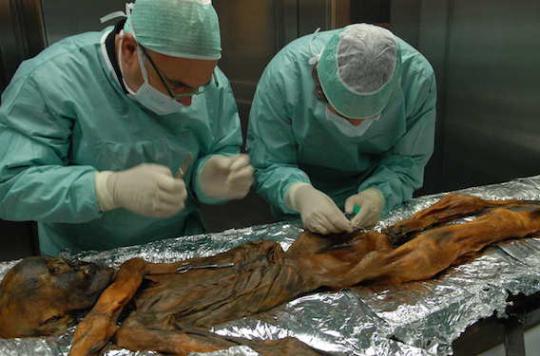The prehistoric man found mummified in the Alps carried a common infectious bacteria: Helicobacter pylori. The analysis of his microbiota has just revealed it.

The real Hibernatus still reveals secrets, 5,300 years after his death. This glacial mummy, discovered in 1991, has just revealed the contents of his stomach. A European team publishes in Science the results of the analysis of Ötzi’s microbiota, real name. The results are enough to fascinate history and biology buffs.
Ötzi is a mummified man found by two climbers in the Hauslabjoch glacier, on the border between Austria and Italy. Nicknamed by the French Hibernatus – in reference to the film of the same name – this prehistoric man has since revealed many secrets about his existence. Various publications have notably learned that he was dark-haired, lactose intolerant, that he had suffered from heel fractures, arthritis and calcifications… but above all that he had died murdered at the age of 40-50.

Reconstruction of Ötzi by Adrie and Alfons Kenni (South Tyrol Archaeological Museum, Foto Ochsenreiter)
A bacteria that mutates
This latest study looked at the contents of his stomach, much like conventional autopsies. The body is too degraded to say if it has suffered from gastric illnesses, such as an ulcer. On the other hand, the researchers were able to take a bacteria frequently present in humans: Helicobacter pylori.
“We had the idea to look for traces of this bacterium in his stomach because we knew, thanks to modern data, that it is a very common pathogen and that it probably existed in humans well before 100,000 years ago” , explained Prof. Albert Zink during a telephone press conference.
He felt bad
Ötzi’s microbiota varies significantly from that of its modern European counterparts. The strain ofHelicobacter pylori discovered in man ice cream comes from Asian ancestry. The inhabitants of modern Europe, on the other hand, have more strains from North Africa. More surprisingly: this strain shares common traits with prehistoric Indian bacteria, even more so with European strains.
And this one bacteria emits virulence factors, the researchers note. This means that at the time of his assassination, Ötzi was certainly feeling sick.
.
















